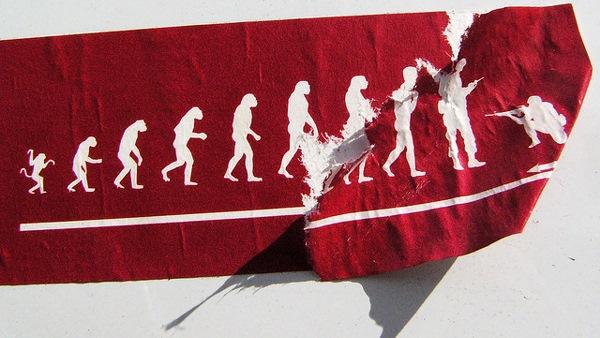‘Politics can no longer save us,’ according to René Girard, the French Catholic theologian who died on 4 November 2015. What did he mean? In a paper delivered two days after Girard’s death, Michael Kirwan SJ explored Girard’s ‘apocalyptic’ vision of a world in crisis and a planet in danger of becoming a ‘scapegoat’. In such a framework, how does the refugee become ‘the central figure of our political history’?
In October 2015, an event at the Cambridge Festival of Ideas examined René Girard’s work and its analogy to Charles Darwin’s theory of evolution. The event celebrated the launch of two volumes of essays, which neatly summarise the relationship.[1] How We Became Human sets out the evidence for a broad compatibility between the mechanism of evolution on the one hand, and Girard’s account of mimetic desire on the other. By contrast, Can We Survive Our Origins? looks at our contemporary crises, and offers the possibility that the adaptations which enabled our species to come into being may not be the ones needed for our continued survival. Do we need to be ‘re-wired’, so as to defuse the evolutionary programming which has brought us to where we, are but cannot take us further? Stanley Kubrick’s rendition of Arthur C. Clarke’s sci-fi novel, 2000: A Space Odyssey has been cited in relation to this question. The film and novel chart, as a kind of diptych, our development from ape to human, and then from human to ‘star child’; a two-stage journey centred on a mysterious black monolith which draws us up to the next ‘level’. Girard differs from Clarke, in seeing our next stage not as an odyssey into space, but a journey of conversion towards the non-violent, transformative power of the gospel. The summons is serious. If we do not answer it, the alternative is, simply, our total self-destruction.
Girard’s later work (i.e. his post-2001 writings) has been called ‘apocalyptic’, a term he takes with the utmost seriousness, for the reasons given above. It conveys a sense that we are in the ‘end-times’, insofar as evolution, the long and arduous process by which we have come to where we are, has run its course. In the face of global threats – the philosopher Slavoj Žižek in Living in the End Times (2010) names the ‘four horsemen of the apocalypse’ as the worldwide ecological crisis, economic imbalances, the biogenetic revolution, and exploding social divisions and ruptures – there is no conceivable adaptive strategy which will enable our survival. So what matters now is not survival, but salvation: an intentional acceptance of the invitation to conversion which requires us to override our evolutionary programming, so that we may ‘choose life’.
At a conference in 2012, on the theme of ‘Catastrophe and Conversion’, René Girard asserted in a plenary session that ‘politics can no longer save us’. The statement was both shocking and comprehensible. Its import came home shortly afterwards, at the time of the climate change conference in Copenhagen, when the world’s leaders, fully aware of the evidence of anthropogenic climate change and of the urgency of the crisis, were unable to agree on the required programme of action. The same sense of paralysis pervades the current migration crisis in Europe. Girard’s espousal of the language and conceptuality of ‘apocalypse’, taken in full religious seriousness, proposes a move ‘beyond politics’. We may ask about the appropriateness and responsibility of this gesture, especially given sensationalist and dramatic resonances of ‘apocalyptic’ in its more popular sense: ‘the end of the world is nigh!’ Is Girard suggesting a taking leave of political engagement (because of its inherent ineffectuality); or is it preferable to see this as a call to a better, more expansive understanding of ‘politics’?
Girard’s declaration that ‘politics can no longer save us’ implies a theological complement to our political efforts. This is centred not on our technological and political capability, but on the biblical notion of apocalypse. This stresses instead the helplessness of our situation, without being paralysed by it; it resists any vestiges of enlightenment optimism: that we can sort this out by ourselves through the same technological mastery that has generated our difficulties in the first place. An ‘apocalyptic’ narrative also allows for an interconnected account, rather than seeing the environmental and political, human and natural crises as separate.
René Girard’s ‘mimetic theory’ is a cluster of insights regarding, among other things, the communal response to the experience of destabilisation and ‘meltdown’ which occurs within a group as a result of the excessively rivalrous interactions of its members. In pre-state societies, without the restraint exercised by judicial and penal institutions, the escalation of intra-group aggression is a threat to the very survival of the community. It is classically represented in terms of uncontrollably malign forces, such as plagues, floods, conflagrations. The resolution, albeit temporary and imperfect, of this crisis is the phenomenon of exclusionary violence – ‘scapegoating’ – for which Girard is best known. The identification and marginalisation of ‘someone to blame’, and the transference of the community’s aggression onto that individual or group, restores peace and brings about unity once again. While this unity is strictly tentative, the cathartic experience is strong and memorable enough to ground a new but mistaken perception of a transcendent order: for Girard (following Émile Durkheim), this is the origin of religion. Violence, as he famously claims, is the ‘heart and secret soul of the sacred’.
Violence arises out of situations of extreme social and natural instability – the ‘four horsemen’ listed by Žižek are related to one another, or perhaps are better described as one single crisis. There is an intuition of this in Pope Francis’ encyclical Laudato si’, which asserts the affinity between environmental depredation and extreme poverty. So there is a chance that Girard’s theory about violence might be extended to include much more. There are several aspects of Girard’s theory which are of especial relevance. Firstly, the description of the planet as the innocent ‘victim’ is now a common motif in theological discourse. Mimetic theory, as an ‘anthropology of the victim’, helps us to align a theological reflection upon climate depredation with other theologies which are ‘partisan’ for the marginalised: liberation, political, black, feminist, queer theologies, etc. Secondly, in the mimetic crisis as described by Girard, there is often a conflation of natural and human causes, as frightened people look for someone/something to blame. A plague or a famine is, for the modern mind, the result of natural factors, but for pre-modern societies the cause may be found in the malice of neighbours, witchcraft, the demonic or divine displeasure. Most recently, Jean-Pierre Dupuy has explored this problem in his reading of the nuclear stand-off of the Cold War as an idolatrous worship of the primitive sacred, and in his ‘treatise on the metaphysics of tsunamis’. He notes, for example, the tendency of victims of the atomic bombs in Japan to speak of something that dropped impersonally ‘from the sky’, as if this terrible act of aggression were a purely natural catastrophe.
The atrocity of 9/11 and the conflicts generated by it are, for Girard in his later work, one signal marker of a phase-change ushering in the era of a newly unbridled ‘escalation to extremes’, a globalised re-launching of the age-old dynamic of violence between nations and groups. Such is the argument of his 2007 book, Achever Clausewitz (English version: Battling to the End, 2010). Girard argues that violence is a phenomenon which we can no longer hope to keep under control by ‘sacrificial’ means. The traditional institution of ‘limited’ warfare (i.e. warfare restricted to a local theatre of conflict, with constraints on weapons and tactics employed, and on the numbers of actors put at risk) held sway in Europe up until the First World War; but the history since then has been of uncontrollable escalation of conflict from these codified parameters. Girard offers a historical thesis: the origins of our crisis are to be found in the French Revolution and its Napoleonic aftermath. This begins in 1806, the year in which Hegel perceived Napoleon as ‘the world spirit on horseback’ riding from the Battle of Jena. This is the first mass mobilisation for warfare. It initiates a fateful escalation of conflict between Germany and France, and foreshadows the modern era of actual and potentially unlimited violence: two World Wars, the Cold War, terrorism and the ‘War on Terror’, all of which have led to every citizen on the planet being placed in the frontline, as a potential combatant.
On this view, our situation is unprecedented, and immensely serious; only the language and conceptuality of ‘apocalypse’ approaches adequacy in helping us to comprehend it – though Girard and Girardian scholars are keen to make it clear that ‘apocalypse’ is not being used here with its popular, sensationalist meaning of a violent divine vengeance. James Alison, for example, distinguishes between ‘apocalyptic’ – a genre of thought and writing associated with cataclysmic violence of the false sacred – and ‘eschatology’, theory of the ‘end times’, which concerns the revelation of the true, nonviolent power of God. Jesus preaches and instills in his followers an ‘eschatological imagination’, not an apocalyptic one. S. Mark Heim considers ‘two kinds of apocalypse’, as absolutely contrasting alternatives – the reign of God and that of the anti-Christ – which can nevertheless look identical. Apocalypses describe the increased violence that may stem from the unmasking of violence: like the increased dosage of a medicine which is no longer working, ‘the sacrificial solution is applied with redoubled, even frenzied effort, but with diminishing success’. The final book of the Bible in particular, seems to mirror the sacrificial violence which is being overcome. The true ending of the Bible is neither the self-destruction of the world, nor a climactic battle. It is, rather, ‘a new creation into which people are adopted’: the New Jerusalem coming down from heaven. Biblical commentators (such as Christopher Rowlands and Richard Bauckham) agree that there is a transvaluation of ‘apocalypse’ in the New Testament, into a non-violent phenomenon. They emphasise the other meaning of apocalypse: ‘unconcealing the true state of things, and of opening the way for a reversal of the present order’.
This is why we need to be careful as to how we read the Book of Revelation. It would appear to be what Girard would refer to as a ‘mixed text’, or a text ‘in travail’, just as Walter Brueggemann speaks of texts which are to be read from ‘within the fray’ and ‘above the fray’. This one is written, surely, by and for people who are struggling within the vortex of mimetic contagion, rather than from a position of serene detachment above it. Particularly problematic passages would include the cries for vengeance from the martyrs (Revelation 6: 9-10), and the extraordinary ‘mythologising’ events of 11:3-13, in which the two unnamed corpses are resuscitated, and a retributionary earthquake kills 7000 people. The problem is that we are tempted to accord Revelation a special status, because it is the last book of the Bible, whereas these curious, violent texts, as Heim counsels, ‘need to be interpreted from the centre of the passion narratives and the Gospels rather than the other way round.’
Such then is the biblical concept of ‘apocalypse’. How is this term to be used helpfully and responsibly to describe the present-day situation of crisis? Dupuy has analysed the prospect of nuclear ‘apocalypse’ in terms of the paralysing fascination of nuclear protection during the Cold War: the age of ‘Mutually Assured Destruction’. The Cold War was one act of homage to our externalised violence, a ‘false god’ as implacable as the most destructive forces of nature. For Michael Northcott, it is ‘the new religion of capitalism’, rather than the arms race, which functions ‘sacrificially’: its irrevocable destruction of the earth’s resources constitutes a ‘crescendo towards paroxysm’, destined to escalate in the struggle for global economic domination between the United States and China.[2] This paroxysm is structurally similar to that of the Cold War, and is likewise to be read in terms of a Clausewitzian escalation of violence, with no logical limit. Earth’s ‘backlash’, in terms of extreme and catastrophic weather conditions, clearly invites a Girardian reading of classic ‘signs’ of apocalyptic disintegration: natural disorder aligned with divine wrath. Girard writes:
Violence is today unleashed at a global and planetary level, bringing about something heralded by the gospel texts on this theme: a fusing of natural and man-made disasters, a confusion of the natural and the artificial orders: global warming and the rising of oceans are today no longer just metaphors [of human violence]. The violence which once generated the sacred, no longer produces anything but itself.
For Northcott, this escalation has necessitated a growing level of planetary ‘sacrifice’, registered in the fact that the ‘innocent victim’ is now, for the first time, our nurturing and sustaining mother-earth, the very basis and condition of the survival of all biological life. The ‘apocalyptic’ dimension of this is that ‘Promethean man’ is delivered up to the law of his own intrinsic dynamic, as it is expressed in the model of the montée aux extrêmes, which Northcott translates as ‘crescendo towards paroxysm’. The religious analogy extends to the dominant ‘cult’ of consumerism; a cult essentially driven by mimetic desire. Appetites are relentlessly mediated through desires, such as those promoted by advertising, and now the victims are all too apparent. ‘Girard’s analysis reveals the link between the cult of consumerism and the sacrifice of the earth: the earth itself becomes the victim, the necessary oblation and scapegoat’.
Girard’s work has been described as ‘the Kingdom of God become scientific’; on the whole it is the biblical terminology which is most typical in his writing, rather than scientific. We have seen how Žižek likewise turns to the Bible. Yet another philosopher, Giorgio Agamben, has been using theological language to describe the failure of contemporary political systems. He sees the current migrant crisis as a graphic example of this failure. It is the classic task of the State to protect citizens: but the collective inability of European states to decide whether to embrace refugees or turn them back demonstrates that every contemporary state is, according to Agamben, a ‘failed state’:
[G]iven the by now unstoppable decline of the nation-state and the general corrosion of traditional political-juridical categories, the refugee is perhaps the only thinkable figure for the people of our time and the only category in which one may see today – at least until the process of dissolution of the nation-state and of its sovereignty has achieved full completion – the forms and limits of a coming political community. It is even possible that, if we want to be equal to the absolutely new tasks ahead, we will have to abandon, without reservation, the fundamental concepts through which we have so far represented the subjects of the political … and build our political philosophy anew starting from the one and only figure of the refugee.[3]
Growing sections of humanity, and not just isolated or exceptional individuals, are no longer representable inside the nation-state. The refugee, a marginal figure, becomes instead the central figure of our political history, because he/she unhinges the trinity of state-nation-territory. Agamben envisages instead some version of reciprocal territoriality or aterritoriality – such as that proposed for Jerusalem, for example – as a new model for international relations.
The general point here is that what W.T. Cavanaugh has described as the ‘soteriology’ of the State (that is, its power to save) is now failing us. The purpose of the State (understood by Thomas Hobbes) is to protect citizens from the violence and chaos which is generated from their own interactions – what Hobbes described as the vicious ‘war of all against all’. Only this protective function legitimates the State’s monopoly on violence, ceded by citizens for the sake of self-preservation. And yet it is the impotence of states which has now become evident, not their protective power. We have become all too aware of their inability to respond effectively, either singly or in cooperation, to the financial, environmental and security threats to humanity.
At the same time, the religious resonances are clear: an inversion of the status of marginalised victim and citizen, which reminds us of the stone which the builders rejected; the roadside victim in Luke’s parable; the groups of needy people listed in Matthew 25 who are the hidden face of Christ. The new polity which Agamben envisages, formed round the marginal figure now become central, is once again an ‘apocalyptic’ scenario, of the New Jerusalem, enthroned at its centre the Lamb of God: slain since the foundation of the world, but now triumphant.
Michael Kirwan SJ is Head of Theology at Heythrop College, University of London.
[1] Pierpaolo Antonello and Paul Gifford (eds.), How We Became Human, and Can We Survive our Origins? (Michigan State University Press, 2015).
[2] Michael Northcott, ‘Girard, Climate Change and Apocalypse’, in Can We Survive Our Origins, pp. 287-310. See in the same volume: Michael Kirwan, ‘A New Heaven and a New Earth: Apocalypticism and its Alternatives’, pp. 311-330.
[3] Giorgio Agamben, ‘Beyond Human Rights’, published in ‘Means Without End. Notes on Politics’, in Theory Out of Bounds, vol. 20. (University of Minnesota Press, London, 2000) [Open 2008/No.15/ Social Engineering]; p. 90.






